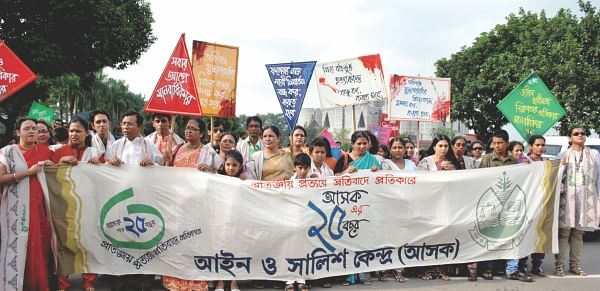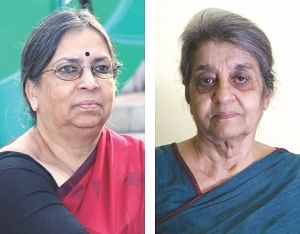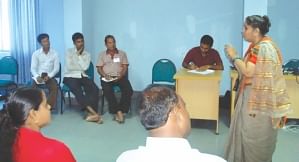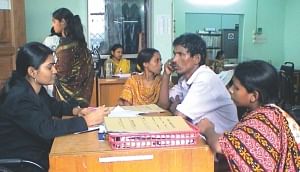| Home - Back Issues - The Team - Contact Us |
 |
| Volume 10 |Issue 39 | October 14, 2011 | |
|
|
Anniversary
Farhana Urmee For the disempowered, courts are intimidating places and access to legal aid is a far cry. Ain O Salish Kendra (ASK) has been fighting for the rights of the common people for the last 25 years. In particular, they have worked for the betterment of women in Bangladesh, who are often victims of domestic violence and discriminatory laws that deprive them of basic rights. Many of these women are not even aware of what their rights are. ASK has worked relentlessly to establish the basic rights of those who do not have the resources to fight for their own rights. For 25 years, the organisation has been providing legal aid to ordinary citizens. It was in 1986 that ASK started its journey as a non-profit organisation providing free legal service to victims of crime or to citizens experiencing any violation of law and rights. With the objective to establish a just society where people are aware of their rights and are able to realise them, ASK has remained vocal and active, often going against conventions or even against rulers under different regimes. Initially, the organisation was more involved in solving family conflicts through shalish (informal interventions) and trying to reach an acceptable solution of problems; however, the increasing number of people taking legal aid from ASK compelled it to expand its activities. Dr Hameeda Hossain, ASK’s Chairman and one of its founding members explains how a group of like-minded individuals decided to form ASK: “In the mid-eighties as military rule came under heavy pressure from populist movements that demanded a return to a representative structure of governance, many of us realised that a formal electoral democracy would not by itself lead to social, economic, political and gender justice. We visualised that active citizens' participation would democratise state institutions and challenge the authoritarian traditions of family and community.”
Hossain explains that five of the founding members came from a legal background, while the rest of them had vast experience of development work, organising rural women at the grassroots level and in the slums. “Given our diverse professional backgrounds, we were able to visualise ASK's role beyond legal boundaries to a more holistic support system on behalf of the disempowered, amongst whom we placed women, workers, minorities and others similarly deprived,” Hossain comments. ASK was founded by Abdul Khaleque, Aminul Haq (Late), Amirul Islam, Fazle Hasan Abed, Hameeda Hossain, Khursheed Erfan Ahmed, K M Subhan (Late), Salma Sobhan (Late) and Taherunnessa Abdullah. Salma Sobhan was the first executive director until her retirement in 2001. While legal aid was often limited to a band aid approach, the experience they gained in addressing individual disputes led the members of ASK to make more strategic interventions to address the social and political causes of conflict in Bangladesh. "At each step as we confronted imbalances of power between contending parties" says Hossain, "ASK became a pace setting catalyst, addressing inequalities through legal intervention, building solidarity amongst human rights defenders around concepts of human rights, gender and social justice, campaigning in national and international forums - challenging the state." ASK executive director Advocate Sultana Kamal and former advisor to the last caretaker government, sheds light on how ASK has become an organisation that looks for the solution of a number of social problems in addition to enriching the knowledge of law and rights among the deprived. Kamal, who has persistently championed the rights of the common person throughout her life, says: “I was not with ASK during the time of its inception. It was in the early 1990s that I got involved with ASK. My work was on the analysis of Muslim laws from the gender perspective. That was before 1990.” Kamal explains that back then ASK was situated at Inner Circular Road. They had very little communication facilities and logical support in that office. “All we had,” she says, “was the aim to uphold human rights and reach our destination to have a society of peace and justice.” Sultana Kamal recalls that back then, ASK often required speakers to build public opinion, and she used to come in her own capacity and tried to contribute by giving speeches, attending public gatherings and other advocacy programmes. In due course, she became an integral part of ASK. Until 1995, ASK did not receive any foreign funding. In 1992, the effect of Babri Masque demolition in India set a series of aftershocks in Bangladesh. "We started to work on the issue of minority rights in the country," says Kamal. In the early 1990s, the violation of human rights in the Chittagong Hill Tracts (CHT) made ASK also concentrate on the issue of indigenous people's rights. It started to focus on a number of critical issues as their primary areas of concern while providing free legal aid service. While working on women's rights issues, ASK discovered that children were also a highly vulnerable group. ASK decided to single out the rights of the working street children. ASK believes that poverty is the worst form of human right's violation. Thus economic empowerment, especially for women deprived of their rights and livelihoods under a patriarchial society, became the prime focus of ASK. ASK began to work on women's property rights. Therefore, as Sultana Kamal points out, the area of work of ASK has been expanded organically since its inception.
ASK has been working as a non government organisation. Currently the organisation operates 17 units with around 240 activists. ASK continues to provide legal support to the deprived masses. As Advocate Nina Goswami, prominent lawyer working at ASK, says, “The legal aid unit is the centre of the whole circle of ASK. ASK has seven Legal Aid Clinics working in the capital. In the case of human rights violation, ASK send its activists out of Dhaka as well to provide immediate help.” In addition, ASK plays a major role in monitoring the human rights situation in the country, especially in the areas of civil and political rights, economic, social and cultural rights, women rights and labour rights. ASK publishes a quarterly bulletin, human rights and annual report and special publications and articles. Its other programmes include advocacy initiatives, child rights, community activism, human rights awareness, legal aid, training and psychological counselling. The organisation's advocacy for stopping human rights violations, giving the deprived legal services and resolving existing social injustices, required proper investigation of particular cases. As a result, the organisation formed investigating teams of its own. Investigation naturally requires documentation, explains Sultana Kamal, adding that an investigation cannot omit a single part of an incident of being recorded. Omission of facts might make the whole report a vague one and the vagueness can nullify the entire effort, leading to a wrong report. If ASK does not have proper records of the cases of human rights violations, the investigation cannot remain fact based, thus jeopardising the credibility of the investigation. Sultana Kamal also points out that common people hardly have any understanding about the differences between rights violation and common crime. Often people allow their rights to be violated considering such violations as established social norms. Human rights violation occurs often because the so-called leaders of a community give validity to such violations. The victims, with little or no knowledge about their own rights, are left helpless and continue to be victimised. As such, awareness building, advocacy and counselling have remained a major concern of ASK. Furthermore, ASK has to conduct professional training for its legal service providers. Again, ASK is trying to reach the youth of the society with the intention to mobilise and socialise them for upholding human rights. Talking about the philosophy of the organisation, Sultana Kamal says that ASK's philosophy is to establish connection among people. The communication among citizens and the communication between the government and citizens is a must for establishing social justice. “The whole effort often faces different challenges. It is a very small organisation that cannot reach every citizen. We can have a concern on a particular issue and recommend some probable solution of the problem but we cannot always make people listen to us,” says Sultana Kamal. She also says that there are challenges from both state's side and the people. When the state is responsible for the violations of human rights, efforts to investigate those and speaking out for justice are often frowned upon. "In that case, the government might minimise our chances to get approval of things and stop pursuing for financial assistance and might make our scope of work limited," says Kamal. "This risk is always there. Another most mentionable challenge we face is the ignorance of people regarding rights and their violation, law and its capacity to protect them. Common people, who are deprived of a number of human rights, are also ignorant in the aspect of perception, lack of education and the attitude of submission toward oppression.” Kamal adds, “A question can be raised as to why there is still repression of women or why human rights are still violated despite a number of steps taken by a number of government/non-government organisations. Again, a number of laws have been formulated but the government has to ensure the further task to be done for their implementation. The change in thinking of a single person (might be a victim) is not enough; a complete social awareness is required. If a woman claims the right to choose her life partner, the whole patriarchy sees the existence of that particular woman as a challenge. Then the society tends to repress her. This is how Fatwas are given by the opinion leaders in a society. After pressing demands our country has got laws protecting the rights of women, policy, right to information and human rights act. But how much these policies and laws are having impact in eliminating discrimination and human rights violation, that should be examined thoroughly”, thinks Sultana Kamal. Again, if corruption prevails and abuse of power and authority continues, violation of human rights will occur as certain after-effects. The government has to check and balance its organs and institutions. Accountability can lead the government to gain public trust. That will help to build a human rights culture, she observes. "We have obtained independence after a long struggle and terrific bloody battle and we have not fought for that democracy which only changes a set of people in every five years" says Kamal. In the long period of 25 years since its inception in 1986, ASK, with its team of dedicated individuals, has been instrumental in helping the marginalised people in society to raise their voice. ASK has brought different rights issues under the limelight and made the government rethink about many of its anti-people polcicies. ASK is celebrating its silver jubilee with the hope of involving more people, bodies and organisations in their struggle to establish human rights, justice and equality in the society. As Advocate Sultana Kamal so eloquently concludes, “"Social justice and equality must be gained. We hope that more people will be involved with our struggle for gaining human rights. People will have their rights realised on the very definition of being human beings. We hope to establish a healthy practice of democracy where citizens and the rulers never go for confrontation rather co-exist with mutual respect and cooperation. We are fighting against all the process of disempowerment of people and the fight will continue.” For a society plagued by injustice and discrimination, ASK has, indeed been a brave champion of human rights.
Copyright
(R) thedailystar.net 2011 |
||||||||



